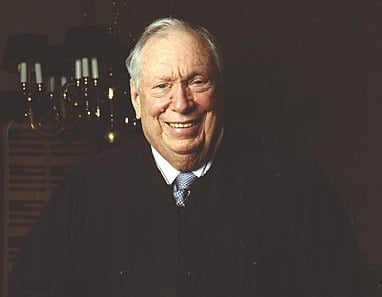Former law clerk who alleged sexual harassment by late 9th Circuit judge blasts judiciary for indifference

Judge Stephen Reinhardt. Photo from Wikimedia Commons.
A former law clerk has written a law review article blasting the federal judiciary’s “staggering scale of institutional inaction and indifference” following her allegations of sexual harassment against the late Judge Stephen Reinhardt of the 9th U.S. Circuit Court of Appeals at San Francisco.
In the essay published in the Harvard Law Review, lawyer Olivia Warren said the inaction “hurts more than I could have ever anticipated.”
Bloomberg Law and Law360 have coverage.
Warren is currently a staff attorney at the Center for Death Penalty Litigation in Durham, North Carolina. In congressional testimony in February 2020, Warren said Reinhardt created a “profane atmosphere” and sexually harassed her on a weekly and even daily basis.
Warren said Reinhardt had commented on the appearance of women, made remarks about her sexual relationship with her husband, and said women lied about sexual harassment. Warren said Reinhardt had expressed surprise that Warren was married because, in his judgment, no man would find her attractive.
Reinhardt died at age 87 in March 2018. Warren worked for Reinhardt beginning in May 2017 until his death.
After Warren testified, 72 former Reinhardt clerks signed an open letter seeking new procedures for reporting workplace misconduct by judges and supervisors, as well as improved training on sexual harassment.
In the law review essay, Warren said testifying had some positive consequences.
“Perhaps the biggest surprise has been a renewed sense of confidence,” she wrote. “As much as I fought to keep Judge Reinhardt’s words from staining my psyche, the refrain of ‘stupid little girl’ and the constant attacks on who I was and who cared about me and who I would become inevitably slipped in to undermine my sense of self. For all of that harm and doubt, there is now new, competing evidence of my own capacity.
“Watching my testimony reminded me that I am a capable attorney because I lawyered my own case, largely alone and in secret, for two-and-a-half years: making a contemporaneous record; gathering available evidence; reporting to neutral third parties; learning complex, overlapping procedural systems and trying to act within them; and finally thinking strategically about other ways to bring light to a wrong.”
Testifying also gave Warren a sense of freedom to tell her story without fear of unpredictable consequences.
“One of the reasons I did not feel safe reporting to the judiciary is that no one could confirm how far my information would go, and thus, if someone with allegiance to Judge Reinhardt retaliated against me, neither I nor anyone else would ever know if it was connected to my disclosure,” she wrote.
After her testimony, Warren said, “there was a 24-hour news cycle in which people within and beyond our profession were appropriately shocked by what I experienced.”
But the brief response is “a distraction from the inevitable inaction,” Warren wrote. “In the past year, I am not aware of anyone taking any steps, much less the ‘bold steps’ over half of Reinhardt’s clerks called for. … We are not safe when there continue to be no consequences for the people who determine the consequences for everyone else.”
A spokesperson for the Administrative Office of the U.S. Courts told Bloomberg Law that the process for reporting harassment has improved since Warren alleged misconduct.
In addition, Democratic U.S. Rep. Hank Johnson of Georgia told Bloomberg Law that the subcommittee he chairs continues “legislative and investigative work” on the issues, and lawmakers expect to take action in coming weeks.



